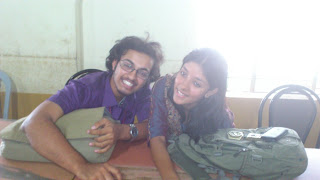You Are What You Eat
When I was a kid, my mother used to say, "You are what you eat!" I'm sure all of us have been told that at some point or the other. The most common response to this statement, not just from kids, is to laugh imagining someone turn into a chicken or a plant or whatever. Only recently did this statement gain more importance (in my opinion) for me. I remember a while back +Krithika mentioning that she read a paper or some review about how our gut microbial community is able to manipulate our thought processes by secreting some chemicals. That put things into perspective. We're nothing but hosts for populations of parasites. In a way, all of us ARE puppets in the bigger order of things. But who's order? That is a very interesting question!
After watching a video by Ed Yong, called "Suicidal Wasps, Zombie Roaches and other tales of parasites", reading a little about the effects of the gut microbial community on us and also a little about how the number of bacterial cells in the average living human body outnumbers the cells of the human itself. This HAS to mean something. And while growing up, I've always tried to find answers to enigmatic questions like, "Who is God?" and the likes (evident from my previous post titled "I Found God"). This led me on a tangential thought process.
Anyway, I can ramble on about my views on philosophy but I'm here to discuss something I found out this morning during my microbiology lab session. My professor mentioned that the gut microbiome is able to "dictate" what food we should crave for depending on what sort of nutrition will help it grow. Basically now, if you feel like digging into that burger which looks like it's going to give you a heart attack in the evening, it's not your fault. And the problem is a little complicated because you can't "resist the temptation" like most other cravings. The bacteria secrete chemicals that signal your brain to order you to crave it. So basically all you're doing is dancing to the tunes of the bacteria's drumbeat. Sounds fancy? It gets worse.
A lot of these cells are potentially pathogenic but the only reason we remain "healthy" (so to say) is because there are many different species of bacteria in there that are competing for a spot. So, going by the host-parasite paradigm, we typically employ the "divide and rule" policy to keep these pathogenic strains from affecting us adversely. But when one, or a group of similar organisms, manages to gain an undue advantage over the others, it could lead to trouble.
The following is an excerpt from the review article "Alcock, J., Maley, C. C. and Aktipis, C. A. (2014), Is eating behavior manipulated by the gastrointestinal microbiota? Evolutionary pressures and potential mechanisms. Bioessays, 36: 940–949. doi: 10.1002/bies.201400071"
Microbes in the gastrointestinal tract are under selective pressure to manipulate host eating behavior to increase their fitness, sometimes at the expense of host fitness. Microbes may do this through two potential strategies: (i) generating cravings for foods that they specialize on or foods that suppress their competitors, or (ii) inducing dysphoria until we eat foods that enhance their fitness.
Just to save you the trouble of Googling it, "dysphoria" is similar to depression. So if you're one of those people who binge-eats when you're sad or angry or basically not in the best of moods, you could be a puppet.
What can we do to prevent this? Theoretically speaking, we should eat balanced diets, yadda yadda, and basically make sure that the microbial communities we harbour aren't provided with conditions that skew the advantage to one side. How you're going to manage to do that will decide whether you can overcome your masters or remain a slave, not knowing that you are subdued and subservient to the whims and fancies of a few prokaryotic cells in your intestines.


Comments
Post a Comment
Please use parliamentary language as this is a public blog. Comments seen as slanderous or hurtful can and will be removed. All discretionary powers lie with the administrator of this blog